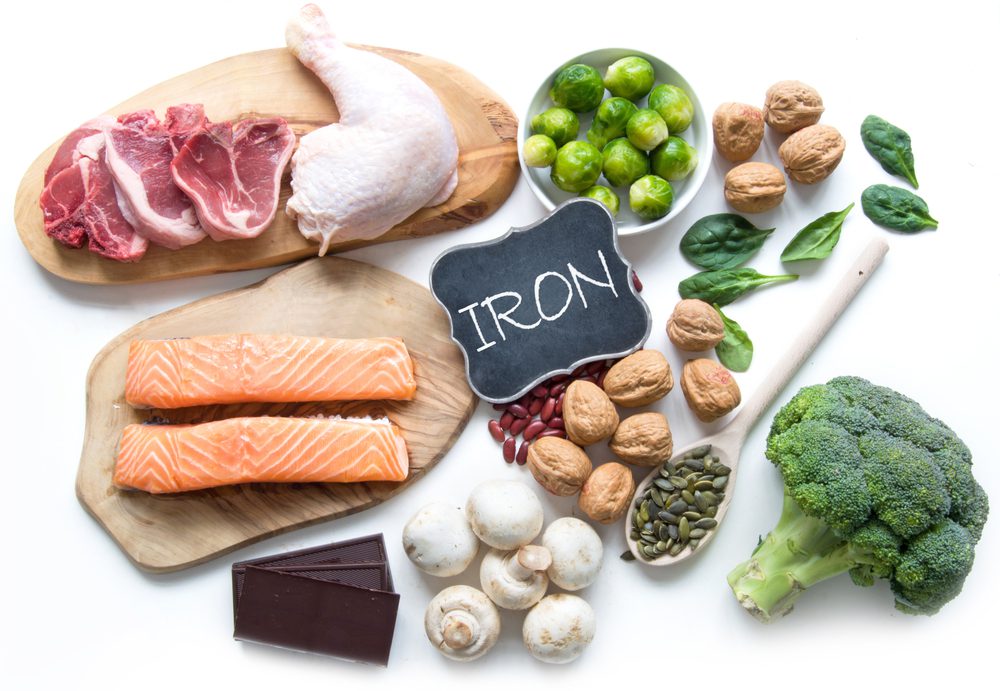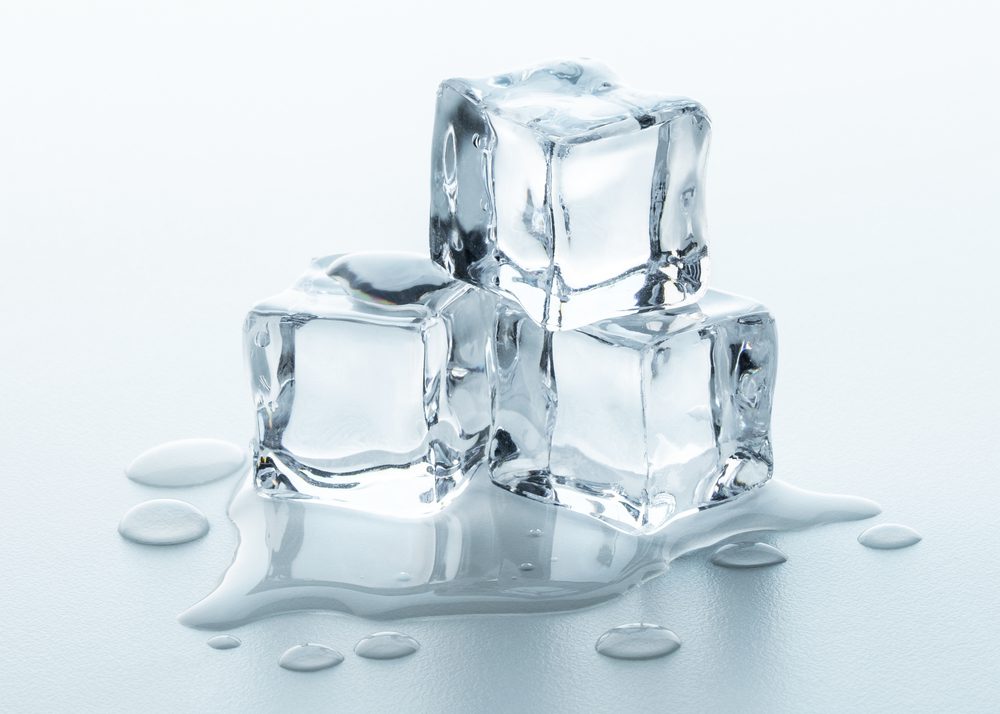
Getting enough iron from your diet and staying away as much as possible from a possible iron deficiency is crucial, especially for women. Iron enhances the red blood cells’ production and sustains your immune system healthy and steady. The iron you get from the food you eat is absorbed into the body by those cells that line the gastrointestinal tract, and the body absorbs a small fraction of the iron you ingest.
The iron is then released into the bloodstream, where there’s a protein known as transferrin that’s attached to it and delivers the iron to your liver. Iron is then stored in the liver as ferritin and then it’s released in the needed amounts to make new red blood cells in the bone marrow.
When those red blood cells can no longer function properly, they are re-absorbed by your spleen. Now that we explained in big lines the primary journey iron has in our body, let’s see:
10 symptoms of iron deficiency:
You are tired
Tiredness is definitely one of the most common symptoms of iron deficiency, but it’s also the hardest to detect. “Women are very used to having hectic lives and feeling constantly tired” as Nancy Berliner, MD, and deputy editor of “Blood”, the journal of the American Society of Hematology, mentioned. “Women usually dismiss being tired as part of life.”
Even so, iron deficiency can cause less oxygen to reach your tissues, hence your body is more deprived of the energy it needs. If the “general” fatigue is accompanied by feeling weak, irritable, or unable to focus, it might have something to do with iron deficiency. I mean, when there’s an iron deficiency that’s constantly progressing into anemia scientists are calling it “tired blood”.
Your periods are painful
For women, the number-one sign of iron deficiency is having extremely painful periods, according to Jacques Moritz, MD, director of gynecology at Mount Sinai St. Luke’s Roosevelt in New York City. As he explained, “women lose a lot of blood, and replace only half of it, and then lose too much again on the following month.”
He compared this to filling up a car with a small hold in the tank. While you might suffer from difficult periods for many other reasons, you should also rule out a possible iron deficiency. After all, imagine that it would all go away by simply adjusting the level of iron your body gets!
You’re pale
Sometimes it makes sense why the words “pale” and “sickly” are used to describe the same person. Hemoglobin is the one that gives your blood its red color, and your skin its rosy hue. This means that low levels of the protein might suck the color straight out of your skin, as Dr. Moritz explained.
If you have a good set of lights at your home, it will be pretty easy to notice. No matter the color of your skin tone, if the inside of your lips, your gums, and the inside of your bottom eyelids are less red than usual, low iron might be to blame. If you recently noticed that you’re paler than usual, the best thing to do is to discuss it with your doctor.

You get short of breath easily
No matter how healthy your lungs are and how deeply you breathe, if you have a low level of oxygen, you will instantly feel out of breath, as Dr. Berliner explained. If you started to notice that you get out of breath by simply doing some of the easiest chores, which you would normally handle just fine, it might have to do with your iron deficiency.
Whether we’re talking about a flight, stairs, or even knocking out the usual workout, you wouldn’t be able to perform properly any of these activities if the iron levels in your body aren’t regular. Check with your doctor to see what’s behind your shortness of breath.
Your heart is pounding
A heart that’s overworked might end up suffering from irregular heartbeats, heart murmurs, even enlargement, and heart failure. So before freaking out, try to rule out any other harmless possibility, such as an iron deficiency.
Because for things to get to that degree of bad, you’d probably have to suffer from iron deficiency anemia for quite some time, as it has been suggested by a review of cardiomyopathy and iron deficiency in the “Texas Heart Institute Journal”.
Even so, if you know you’re known to suffer from heart problems, it is very important to check your iron levels as iron deficiency might only worsen existing heart problems.
You have restless leg syndrome
If you’ve never heard of this before, the restless legs syndrome (RLS) is an overwhelming urge to move your legs. The symptoms are usually more severe during the evening and at night, and it might disrupt your sleep. One of the most common causes of restless leg syndrome is low iron in the brain. This can be found out, to a fair degree, through ferritin level testing in the blood. Your low ferritin levels might indicate a certain state of iron deficiency and iron supplements or infusions might be needed to level up the brain iron. In some cases, iron treatment can be enough to resolve the problems.
Your head hurts
An iron-deficient body will definitely prioritize getting more oxygen to your brain before it starts worrying about other issues. However, even when it does this, your brain will still get less than it should have, as Dr. Berliner confirmed.
As a response, the brain’s arteries are starting to swell, which is the reason why you’re suffering from constant headaches, as the National Headache Foundation explained. When you know you’ve been dealing with headaches or migraines for quite some time now, you can always make a round check-up to see if the pain is coming from a possible iron deficiency.

This one’s a bit odd, but you might crave clay, dirt, and ice
The phenomenon is known as pica, and it basically describes having cravings and actually ending up eating non-food substances which can be a big sign of iron deficiency. Iron-deficient people might be tempted to start chewing chalk, clay, dirt, and paper.
Luckily enough, the majority of women will always opt for ice, as Dr. Berliner confirmed, who always recommends her anemic patients come back to see her if they start craving ice. So, if you have recently been dealing with odd cravings such as those listed above, then we’re highly recommending you visit your doctor.
You are anxious for no reason
As if iron wouldn’t care how stressful might already be, when you’re suffering from an iron deficiency, it only makes you feel more anxious. A lack of oxygen will rev up your body’s sympathetic nervous system, which is similar to your body’s gas pedal, as Dr. Berliner said.
Even more, since iron deficiency might send your heart racing, it’s pretty easy to feel as if you’re in a fight-or-flight mode even when you have all the reasons in the world to feel relaxed. Another reason why this symptom might be a bit more complicated is that when you feel anxious, the last thing on your mind is that it might be due to an iron deficiency.
You’re losing a lot of hair
An iron deficiency that progresses into full-blown iron deficiency anemia might cause hair loss. As Dr. Moritz explained, “it will send your body into full survival mode, so your body will channel oxygen to support vital functions, in comparison with one that would keep your hair intact.”
However, if there are only a few hairs in your drain, you shouldn’t worry, as it’s perfectly normal to lose 100 hairs on a good day.
If you enjoyed reading this article, we also recommend reading: 9 Healthy Snacks You Should Actually Avoid, Says Science

























